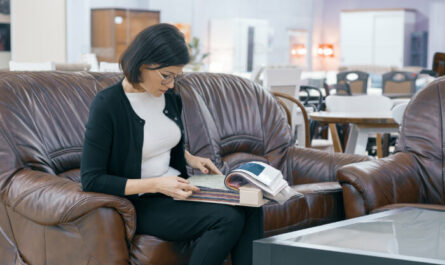Vermont retailer rises from futons to upscale contemporary and $4K+ average tickets
Mark Binkhorst opened Burlington Furniture right after he graduated from the University of Vermont in 1984.
A native of Brooklyn, N.Y., Binkhorst decided he liked the town and its sensibilities. Burlington is the big city of Vermont, and it’s the center of the state’s legendary liberal movement.
For instance, during Binkhorst’s time in college, Bernie Sanders was elected mayor of Burlington, the first socialist in charge of a New England city since World War II. Although some were predicting that Sanders would ruin Burlington, it was and continues to be a vibrant small city on Lake Champlain with easy access to the Green Mountains.

“It’s always been a friendly place,” Binkhorst says. “Right from the beginning, there has been just a great sense of community here.”
And since he had just finished college with a “self-defined major in international diplomacy and finance with a focus on the third world,” he did not have an obvious career track in front of him and would have to start from scratch.
His foray into furniture started with the purchase of 14 futons in Boston and moving them up to Vermont in a U-Haul.
That worked out well and Burlington Furniture began to take shape. As the years went by, the store, a member of the Contemporary Design Group, shifted its focus from futons to stylish contemporary brands such as American Leather, BDI and Copeland. The retail space in a former maple syrup plant was replaced by the current 40,000-square-foot showroom just below downtown Burlington as it edges up to Lake Champlain.
The move, more than a decade ago, to the new building with its tall ceilings and large glass windows helped the store increase its average tickets from $755 to $2500 immediately, and that has continued to grow to now more than $4,000.
“Having started as a futon company,” Binkhorst says, “we were always a value proposition. The new store really helped change that. Now, we’re all about creating an experience and a value-added proposition that goes beyond just selling a piece of furniture.”
Of course, the products in the store evolved beyond futons rapidly, and they continue to do so. In addition to the stalwart resources carried by most market-leading contemporary stores, Burlington Furniture is adding an outdoor furniture department. Binkhorst says the outdoor season in Burlington may be short, but people want to take advantage in style and comfort.
The Contemporary Design Group has been a huge help for Binkhorst in terms of not just buying but networking with similar retailers. He joined about 10 years ago.
“As an independent store, we didn’t have the kind of access to our peers that the CDG has brought to us,” he says. “These relationships we have with each other create the sort of instant board of directors that holds us accountable for following through on our plans and resolving our problems.”
Like many of his neighbors in Burlington, Binkhorst strives to be a good neighbor and a good steward of resources. He talks about “triple net bottom line,” listing business profitability as something he wants to share with people who need help and also the environment.
Working with The Nature Conservancy, the store’s cumulative contributions have helped to plant more than 3500 trees over the past decade. Recently, 1 percent of monthly sales were donated to a local food bank, a $6000 contribution.
Additionally, Burlington Furniture is a generous contributor to a number of local non-profits, including Green Mountain Habitat for Humanity, the local Committee on Temporary Shelter and the Humane Society of Chittenden County.
“We feel obligated,” Binkhorst says. “Just as we know we have a roof over our heads, we also know there are many people not as fortunate.”

 by
by 


